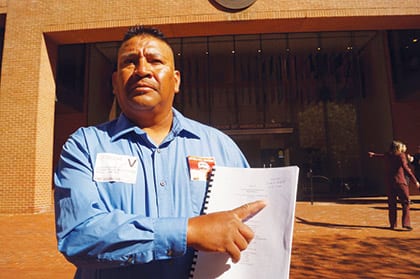
U.S. Customs and Border Protection agents have killed more than 50 people along the Mexico-U.S. border since 2010, including unarmed minors shot in the back, yet none have been held accountable. Prosecutors routinely ground such cases while courts dismiss civil complaints.
Against that disturbing backdrop, International Human Rights Law Clinic Co-director Roxanna Altholz ’99 works feverishly—and creatively—to help victims’ relatives achieve legal redress.
“When it became clear that different types of litigation in the U.S. and Mexico wouldn’t offer redress, we looked at international strategies,” she says.
Working with a San Diego nonprofit led by classmate Andrea Guererro ’99, Altholz oversaw a 2015 clinic report that urged reframing law enforcement killings as human rights violations. It provided an instructive legal roadmap for family members and advocacy organizations.
The following year, relatives of Anastasio Hernández Rojas retained the clinic to sue the U.S. before the Inter- American Commission on Human Rights. In 2010, agents repeatedly beat and tased Hernández, a father of five who died two days later.
Despite eyewitness and video evidence, the Department of Justice concluded that the agents acted lawfully. The clinic’s complaint alleges U.S. responsibility for torturing and killing Hernández and insufficiently investigating the perpetrators, in violation of international human rights law.
“It’s the first time the Inter-American Commission has considered a case against the U.S. involving an extrajudicial killing by law enforcement,” Altholz says.
Clinic students have conducted extensive legal research, drafted pleadings, developed a multi-media presentation for advocacy groups to use, and helped generate broad media coverage about the case.
“They are exploring novel arguments challenging the Fourth Amendment’s excessive use of force doctrine: Beyond the agents’ actions being excessive under international law, the laws and policies that led to the DOJ’s conclusion themselves violate international law,” Altholz explains.
The commission is reviewing the government’s response and will soon issue an admissibility report.
Despite the struggles to prevent border agents from acting with impunity, Altholz remains resolute.
“My frustration and anger funnels into stubbornness and working harder,” she says. “And as a teacher, doing this with students feels like a gift because I can see how transformative the work is for them.”
—Andrew Cohen